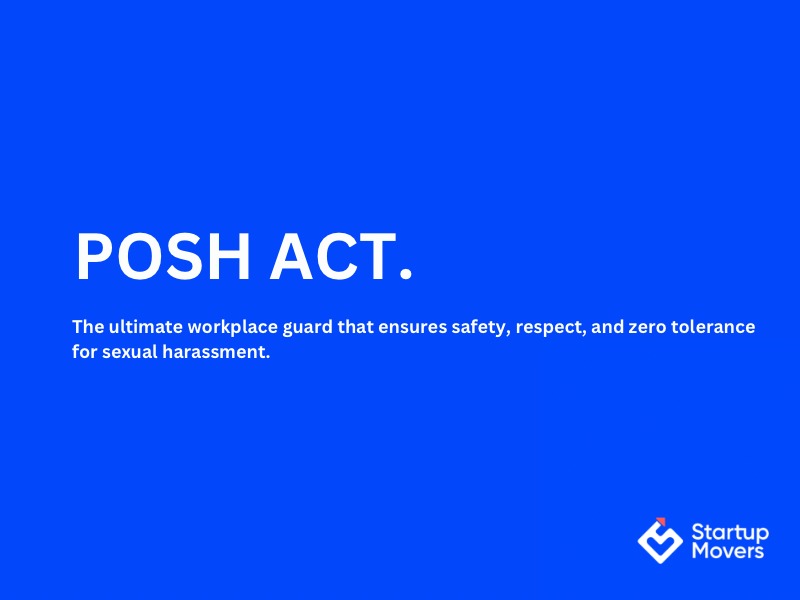Ensuring POSH at the workplace is crucial for startups. In this blog, learn why POSH compliance is important, how to avoid non-compliance, and tips for Indian startups. Dive in to build a safe, productive environment for your team. Read on to learn more!
|
💡What is Sexual Harassment?
Sexual harassment is an unwelcome behavior of a sexual nature that can occur in various forms. According to legal definitions, it includes any one or more of the following acts:
- Physical contact and sexual advances: Any unwanted physical interaction, ranging from inappropriate touching to forceful advances.
- Demand or request for sexual favors: Asking for sexual favors in exchange for professional advantages or other benefits.
- Making sexually colored remarks: Comments or jokes that are sexually suggestive or offensive.
- Showing pornography: Displaying pornographic material, whether online, in print, or through any other medium.
- Making sexual sounds/noises: Producing sounds or noises with a sexual connotation.
- Inquiring about a person’s sex life: Asking intrusive questions about someone's private sexual experiences.
- Spreading sexual rumors: Sharing false or private information about someone's sexual activities.
|
Decoding The POSH Act, 2013
The POSH Act, 2013, stands for the ‘Prevention of Sexual Harassment’ at Workplace Act. Enacted by the Indian government, Posh at Workplace aims to protect employees from sexual harassment at their workplace. This Act mandates a safe working environment for all employees, especially women. It ensures that employers take necessary steps to prevent and address sexual harassment issues, thereby promoting workplace safety.
Is POSH Act, 2013 Applicable to Your Startup?
POSH implementation on your startup depends on the following criteria:
- Workplaces Covered: The Act applies to all workplaces, including government offices, private sector organizations, non-governmental organizations, educational institutions, and even the unorganized sector. This broad scope ensures that all forms of employment are covered under its provisions.
- Employees Covered: The POSH at Workplace Act covers all women employees, irrespective of their nature of employment. This includes regular, temporary, contract, and part-time workers, interns, and even domestic workers. It ensures that any woman engaged in work, directly or indirectly, is protected under the Act.
- Types of Harassment Addressed: The Act addresses various forms of sexual harassment, including unwelcome physical contact, sexually colored remarks, showing pornography, and any other unwelcome conduct of a sexual nature. This broad definition helps in covering all potential scenarios of harassment.
- Employment contracts: Employment contracts must be updated to incorporate provisions related to the organization’s POSH policy. These provisions should clearly state the commitment to maintaining a harassment-free workplace. They should also outline the consequences of violating the policy. This ensures that all employees are aware of their rights and responsibilities regarding workplace conduct and the importance of adhering to the POSH guidelines.
- Employer Responsibilities: Employers are mandated to create a safe working environment. This includes the establishment of an Internal Complaints Committee (ICC) at every workplace employing 10 or more employees. For workplaces with fewer than 10 employees, or if the workplace does not fall under the usual scope, a Local Complaints Committee (LCC) at the district level is responsible for handling complaints.
Key Provisions & Compliance Requirements of POSH at Workplace Act
The POSH Act, 2013, outlines several key provisions that startups must adhere to:
- Internal Complaints Committee (ICC): Every organization with 10 or more employees must establish an ICC. This committee handles complaints of sexual harassment and conducts inquiries.
- Employee Awareness: Employers must educate their staff about the POSH Act and its provisions. Regular training sessions and awareness programs are necessary.
- Complaint Mechanism: A clear and confidential process should be in place for lodging complaints. Employees must know how and where to file complaints, ensuring their employee rights are protected.
- Time-bound Resolution: Complaints should be resolved promptly. The Act specifies a 90-day timeframe for the ICC to complete the inquiry.
- Annual Report: The ICC must prepare an annual report detailing the number of cases filed, resolved, and pending. This report is submitted to the district officer.
Compliance with these provisions is crucial for maintaining a safe and respectful workplace.
Consequences of Non-compliance with POSH Regulations
Failing to comply with the POSH at Workplace Act, of 2013, can lead to severe consequences for startups:
- Monetary Penalties: Non-compliant organizations may face fines up to INR 50,000. Repeated violations can double the penalty.
- License Revocation: Persistent non-compliance can result in the cancellation of business licenses.
- Legal Repercussions: Under POSH at workplace, organizations and individuals can be subject to legal actions, leading to lawsuits and further financial losses.
- Reputation Damage: Non-compliance can severely tarnish a startup’s reputation. It may result in a loss of trust among employees and clients.
- Employee Attrition: Unsafe work environments lead to high employee turnover. Talented individuals may leave the organization, affecting productivity and growth.
Source: Ministry of Women & Child Development
Avoid Costly Non-Compliance
Protect your startup from penalties and reputation damage.
Get on a 1:1 call with us
Why is POSH at Workplace Compliance Important for Startups?
Ensuring compliance for POSH at workplace is essential for startups to foster a healthy, inclusive, and productive work environment. It lays a strong foundation for ethical workplace practices and enhances the overall growth trajectory of the organization.
1. Building the Culture for the Future of Your Organisation
POSH compliance helps in instilling a culture of respect and safety from the onset. Startups that prioritize POSH regulations demonstrate a commitment to workplace ethics and respect for all employees. This cultural foundation is crucial for future growth and sustainability. By setting these standards early, startups can prevent toxic behaviors and ensure a positive work environment as they scale.
2. Creates an Inclusive and Safe Work Environment
An inclusive and safe workplace attracts diverse talent, fostering creativity and innovation. Complying with POSH at workplace ensures that all employees, regardless of their gender, feel secure and valued. This not only boosts morale but also enhances productivity. Employees are more likely to contribute positively when they know their workplace is committed to preventing harassment and addressing any issues promptly.
3. Safeguards Reputation and Boosts Investor Confidence
Compliance with POSH at workplace regulations is a mark of a responsible and ethical business. It safeguards the startup’s reputation, which is particularly important in the competitive business environment. Investors are more likely to trust and invest in companies that demonstrate a commitment to ethical practices and employee well-being. A positive reputation can lead to better business opportunities and partnerships.
4. Differentiating as an Employer of Choice in Competitive Markets
In a competitive job market, being known as an employer that prioritizes employee safety and inclusivity can be a significant differentiator. Startups that adhere to POSH guidelines are seen as progressive and employee-centric. This reputation helps in attracting top talent who are looking for a respectful and safe work environment. It also enhances the company’s employer brand, making it easier to retain high-quality employees.
5. Improves Employee Retention and Satisfaction
A safe and respectful workplace directly impacts employee satisfaction and retention. Employees are more likely to stay with an organization that values their safety and addresses their concerns. POSH compliance ensures that startups have the necessary mechanisms to handle complaints and create a supportive environment. This leads to higher employee engagement, lower turnover rates, and a more motivated workforce.
How Can Startups Handle POSH Complaints?
Handling POSH at workplace complaints effectively is crucial for startups to maintain a safe and respectful workplace. Here’s a step-by-step guide for the Internal Complaints Committee (ICC) to ensure complaints are addressed systematically and timely:
Step 1: Verify Jurisdiction
When a written complaint is received, the ICC must verify its jurisdiction by:
- Confirming the identities of both the complainant and the respondent.
- Ensuring the allegations fall within the definition of 'sexual harassment' under the POSH Act.
- Checking if the complaint was filed within 3 months from the date of the last incident (an extension of 3 months can be granted at the ICC's discretion).
- Confirming the respondent is an employee of the organization.
- Verifying that the incident occurred at the workplace.
Step 2: Initial Discussion with Complainant
The ICC should conduct an initial conversation with the complainant to understand the allegations better and explain the procedure and available redressal options.
Step 3: Initial Discussion with Respondent
Next, the ICC should have an initial conversation with the respondent to inform them about the complaint, the procedure, and their rights.
Step 4: Deliver the Complaint Copy to the Respondent
The ICC must deliver a copy of the complaint to the respondent within 7 working days of receiving it, allowing them 10 working days to submit their written response. This ensures fairness and an unbiased inquiry.
Step 5: Follow-up with Complainant on Resolution Choices
The complainant has the option to choose between conciliation or inquiry. If opting for conciliation, the respondent must be informed to agree, deny, or negotiate the terms.
Step 6: Interview Complainant, Respondent, and Witnesses
If an inquiry is chosen, the ICC should individually meet with the complainant, respondent, and any witnesses to gather detailed information. Questions should be open-ended and non-leading.
Step 7: Allow Cross-Examination
Both parties should be allowed to cross-question each other and witnesses, under the supervision of the ICC to prevent any personal or derogatory questions.
Step 8: Prepare Inquiry Report
The ICC should prepare an inquiry report with recommendations within 90 days of receiving the complaint. The employer then has 60 days to implement the recommendations.
Checklist for POSH Compliance for Startups
Ensuring POSH compliance is vital for creating a safe and respectful work environment. Here’s a practical checklist to help startups adhere to the POSH Act, of 2013, and foster a culture of inclusivity and safety:
- Form an Internal Complaints Committee (ICC)
- Establish the ICC if you have 10 or more employees.
- Appoint qualified members, including a senior female employee, two other employees committed to women's causes, and an external member from an NGO or with relevant experience.
- Provide necessary training to ICC members.
- Draft a POSH Policy
- Create a comprehensive policy defining sexual harassment and outlining the complaint and redressal process.
- Communicate the policy to all employees through handbooks and notice boards.
- Conduct Awareness Programs
- Organize regular training sessions on POSH Act provisions.
- Conduct sensitization programs to promote a respectful workplace culture.
- Set Up a Complaint Mechanism
- Establish a clear and accessible process for filing complaints.
- Ensure confidentiality throughout the complaint process.
- Timely Inquiry and Resolution
- Conduct a prompt and fair inquiry into complaints, completing it within 90 days.
- Take appropriate actions based on ICC findings.
- Maintain Documentation
- Keep detailed records of complaints, inquiries, and actions taken.
- Prepare an annual report of cases filed, resolved, and pending, and submit it to the district officer.
- Regular Review and Updates
- Regularly review and update the POSH policy to reflect legal or organizational changes.
- Implement a feedback mechanism to gather employee input on policy and training effectiveness, ensuring an inclusive work environment.
- External Assistance
- Include external members in the ICC with relevant expertise.
- Engage with POSH consultants or legal advisors for compliance and best practices.
Following this checklist will help startups ensure POSH compliance, creating a safer and more respectful work environment for all employees.
Wrapping Up!
POSH at the workplace is essential for startups to ensure a safe, inclusive, and productive environment. By adhering to POSH compliance, startups can build a strong foundation, safeguard their reputation, and boost employee satisfaction. Implement these practices to foster a respectful workplace culture today!
Frequently Asked Questions
Q. Is POSH compliance required for new businesses?
Yes, POSH compliance is mandatory for all businesses in India, including new startups, with 10 or more employees. This ensures a safe and respectful work environment for all employees.
Q. What actions should startups do in response to a sexual harassment complaint?
Startups should take the following steps in response to a sexual harassment complaint:
- Verify the jurisdiction of the complaint.
- Conduct initial discussions with both the complainant and the respondent.
- Forward the complaint to the respondent for their response.
- Follow up on the complainant's choice of redressal.
- Conduct a detailed inquiry and cross-examination.
- Prepare and submit an inquiry report with recommendations.
Build a Respectful Workplace Today!
Create a safe, inclusive, and harassment-free environment for your startup.
Start Your POSH Compliance Journey





